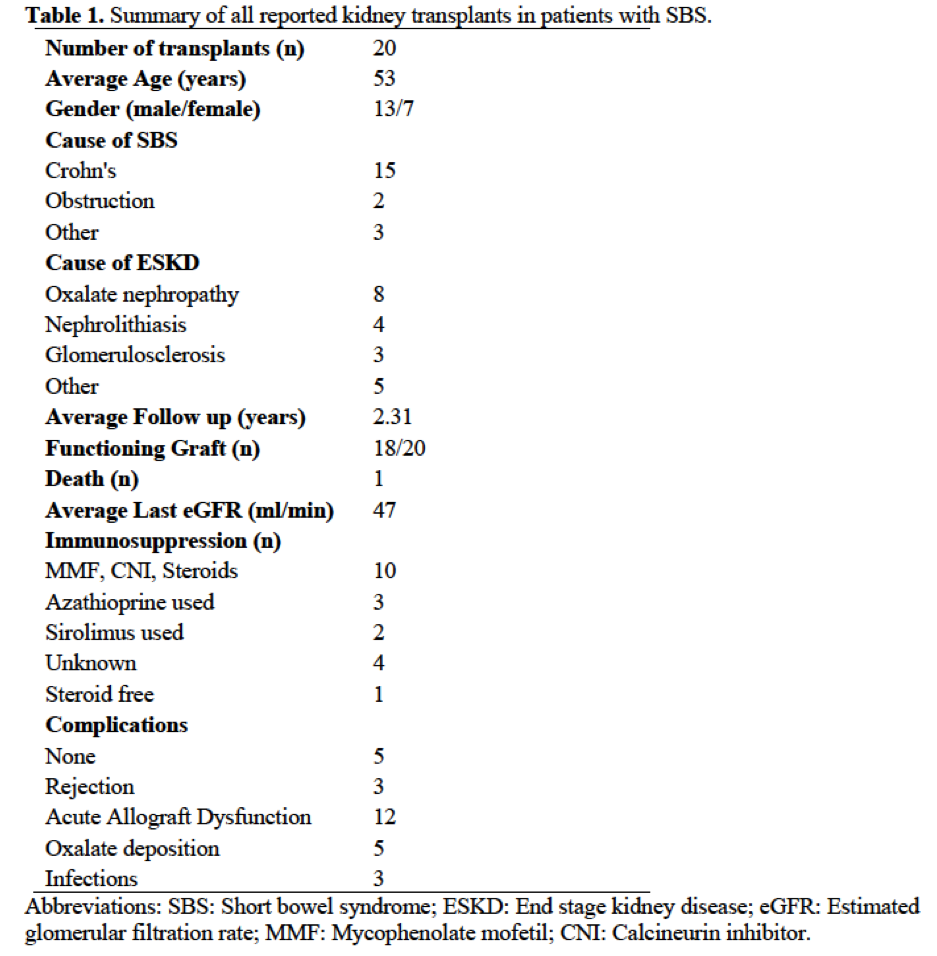Kidney Transplantation and Short Bowel Syndrome: Outcomes and Challenges
1American University of Beirut, Beirut, Lebanon, 2Nephrology, Brigham and Women's Hospital, Boston, MA, 3Transplant Center, Massachusetts General Hospital, Boston, MA
Meeting: 2020 American Transplant Congress
Abstract number: C-318
Keywords: Graft function, Kidney transplantation, Short gut syndrome
Session Information
Session Name: Poster Session C: Small Bowel: All Topics
Session Type: Poster Session
Date: Saturday, May 30, 2020
Session Time: 3:15pm-4:00pm
 Presentation Time: 3:30pm-4:00pm
Presentation Time: 3:30pm-4:00pm
Location: Virtual
*Purpose: Among patients with short bowel syndrome (SBS), kidney disease is highly prevalent due to volume depletion, crystal nephropathies, and many other reasons. Kidney transplantation (KT) in this patient population poses many challenges and reports of post-transplant patient and allograft outcomes are scarce and scattered. In this report we describe a case of KT in a patient with SBS and retrospectivelly analyze graft and patient survival of all previously reported similar cases.
*Methods: We conducted a systematic retrospective pubmed search to identify all previously published cases of patients with SBS who underwent KT, using the words: short bowel syndrome; kidney transplantation; end-stage kidney disease; end-stage renal disease; enteric hyperoxaluria; and oxalate nephropathy. We compiled relevant data on demographics, etiology of kidney disease, complications after transplantation, immunosuppressive regimens, long-term kidney allograft function, and patient- and graft-survival.
*Results: We report a case of a 59-year old man with SBS secondary to Crohn’s disease, as well as end-stage kidney disease of unclear etiology, who underwent a deceased donor KT. His post-transplant course was complicated by recurrent episodes of acute kidney injury due to volume depletion from diarrhea. He ultimately received permanent intravenous access to allow daily volume expansion at home. Subsequently, he had an excellent clinical course with normal kidney function up to 2-years post transplant (eGFR>60 ml/min/1.73m2) and excellent functional status and quality of life. Next, we identified 9 reports of another 19 kidney KT (Table 1) performed between 1988 and 2017 representing 18 patients (1 patient received 2 KT). Patients were predominantly male (65%) and middle-aged (mean age 53 years) at the time of transplantation. Crohn’s disease was the most common etiology of SBS, and the most prevalent cause of kidney disease was oxalate nephropathy. The mean time of follow-up was 2.3 years. Post-transplant complications were common, in particular delayed graft function, AKI, and recurrent oxalate deposition. All patients, but one were alive at the time of last reported follow up, and among the 20 KT, 18 allografts (90%) were functioning (including the described case), with a mean eGFR of 47 ml/min/1.73m2.
*Conclusions: Despite high rate of complications, kidney transplantation is feasible in patients with short bowel syndrome and is associated with acceptable short- and mid-term patient and graft survival.
To cite this abstract in AMA style:
Diwan EAbou, Patel A, Elias N, Safa K. Kidney Transplantation and Short Bowel Syndrome: Outcomes and Challenges [abstract]. Am J Transplant. 2020; 20 (suppl 3). https://atcmeetingabstracts.com/abstract/kidney-transplantation-and-short-bowel-syndrome-outcomes-and-challenges/. Accessed February 16, 2026.« Back to 2020 American Transplant Congress

